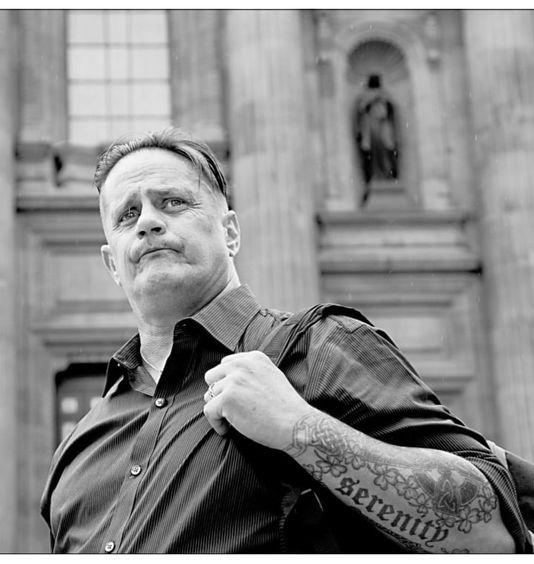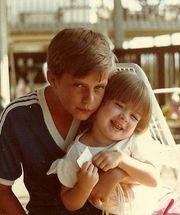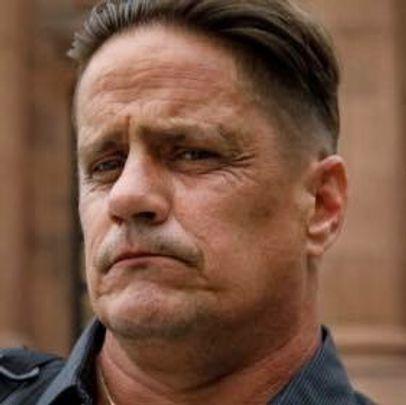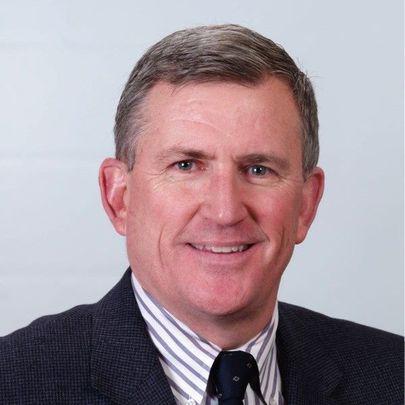|
'It's not about me anymore. It's about others,' says victim of Pa. priest abuse
By Brandie Kessler
York Daily Record
August 23, 2018
https://www.ydr.com/story/news/2018/08/23/victim-philly-archdiocese-wants-help-other-victims-clergy-abuse-pennsylvania-grand-jury-report/1068580002/
 |
| John Delaney was sexually abused and raped by a priest beginning when he was 10 or 11 years old. Delaney said he remembers the fog he was in after the Philadelphia archdiocese grand jury report was complete, and he wants victims whose abuse was detailed in the recent report to know they're not alone. |
 |
| John Delaney, of Philadelphia, was abused by a priest beginning when he was 10 or 11 years old. His abuse was detailed in the 2005 Philadelphia archdiocese grand jury report. He offered advice for those whose abuse was detailed in the recent grand jury report into six other Catholic dioceses in Pennsylvania. |
 |
| John Delaney, who was abused by a priest in the Philadelphia archdiocese beginning when he was 10 or 11 years old, testified before the grand jury investigating the Philadelphia archdiocese. That report was released in 2005. Delaney said he wants victims whose abuse was detailed in the recent grand jury report to know they're not alone. |
 |
| Robert Hoatson, co-founder and president of Road to Recovery, an organization that assists victims of abuse and their family members, is also a survivor of clergy sexual abuse. He said it's important for survivors to find someone, preferably a therapist, to talk to about the abuse they suffered. He said the recent grand jury report will likely give survivors who have yet to disclose the courage to finally do so, since seeing that they're not alone might be the impetus they need to finally reach out for help themselves. |
[with video]
John Delaney knows what’s happening in the hearts and minds of those whose abuse is detailed in the recently released grand jury report on Pennsylvania priest sex abuse.
He lived through what they’re all going through now -- the range of emotions from anxiety and excitement, to embarrassment and exhaustion.
Delaney, 47, was in their shoes back in 2005, when a grand jury investigation into the Philadelphia archdiocese was presented.
Delaney, born and raised in Philadelphia but now living in Tennessee, was sexually abused and raped for years by a priest in his parish beginning when he was 10 or 11 years old.
Fifteen years ago, when Delaney testified before the grand jury investigating the archdiocese, he disclosed things he hadn’t ever processed.
“I spent weeks telling them things that had happened that I hadn’t really mentioned before,” Delaney said. “It was long, and it was exhausting.”
Delaney's abuser, Father James Brzyski, was called one of the archdiocese's "most brutal abusers."
Brzyski, who abused an estimated 100 children over a seven-year period in two parishes in the Philadelphia archdiocese, told some victims the lie that their parents knew of or even sanctioned the abuse.
Delaney told the grand jury that Brzyski abused him more than 100 times.
Over the 13 years that have passed since Delaney’s story was made public in the archdiocese grand jury presentment, he has done a lot of work on himself, and he now helps others. He works as a certified recovery coach and helps people with sexual abuse recovery.
He said the path ahead for other victims won’t be easy, but they need to remember two things:
Others, like him, have been through this before, so it can be done.
And, equally important, Delaney said, “You’re not alone, and you don’t ever have to feel that way ever again.”
'Silence kills victims'
For a self-proclaimed “Philly guy,” someone who preferred settling differences with childhood classmates by fighting them in the schoolyard instead of quietly behind closed doors, the opportunity for Delaney to put his abuser’s name out there for all to see pumped him up before the presentment.
But as the presentment grew closer, he got really scared.
“There’s a stigma about being a man and being abused,” Delaney said. Some people think such abuse means the victim is gay or will become gay. He hates that stigma, especially because it’s not true.
“And who cares if you’re gay or not?” Delaney added. “You were abused.”
Some of those whose abuse was detailed in the recent report might feel similarly.
But Delaney hopes they will try to work through things the way he did, and he hopes they will have more support than he did.
“Back then, my coping mechanism was alcohol and drugs,” he said. After the archdiocese report was out, he remembered detectives drove him home, and he went inside and cracked a bottle of Irish whiskey and punched a metal pole for about an hour.
“I went down a really rocky road after that,” Delaney said.
The metaphorical hangover that comes in the weeks following the grand jury release -- when the elation most victims felt after finally being counted and acknowledged starts to settle down, and the media attention and public attention moves on to the next thing -- can feel crushing, he said.
It took him more than a decade following the archdiocese grand jury report to finally get sober. He went to funerals for two friends who were also victims of clergy sexual abuse, and whose abuse was detailed in the 2005 report.
One took his own life. The other died after years of drug and alcohol abuse, trying to numb the pain and trauma of abuse, he said.
Delaney doesn’t want to bury any more victims of clergy sexual abuse.
He said he knows for victims who haven’t yet disclosed their abuse, the thought of doing so and being judged or being doubted is terrifying.
But, he said, it’s crucial for them to find someone they trust, or find a professional, and talk to them.
“Silence kills victims,” Delaney said. “And I don’t want anyone else to die.”
Robert Hoatson, co-founder and president of Road To Recovery, based in New Jersey, which has helped more than 5,000 victims of childhood sexual abuse and their family members since 2003, agreed that victims need to find someone to talk to.
"It's all part of the mechanism after the abuse occurs," Hoatson said of the secrecy. Children blame themselves when something bad happens, including when they're abused.
"The response is, 'Oh my goodness, an adult would never do this to a child, so I must have done something wrong,'" Hoatson said. "That gets placed in a vault until the person is ready to talk about it."
But after a lifetime of stuffing that childhood secret and that trauma to the back of their mind, an adult might still be afraid to let it out, Hoatson said. That's where the example of the victims who have spoken out to the grand jury and who are talking to the media, as well as the positive response to those people, is helpful.
Hoatson said he's gotten phone calls from around the country and even internationally since the grand jury report was released on Aug. 14.
"One of the reasons we get such a tsunami of a response after something is revealed like a grand jury report is because survivors begin to feel they are not alone," Hoatson said.
When Hoatson, a victim of clergy sexual abuse himself and a former priest in the Archdiocese of New York, hears from a victim, he tries to set up a meeting in person. That way there's a chance to make a connection and show that person they're not alone.
For family and friends of victims, Delaney advised just being present and patient.
“Be there for the person, listen to them, let them talk,” he said. “Encourage conversation, but don’t push.”
And keep reassuring the victim it’s not their fault, he said.
Still fighting, now for others
Aside from family and friends who can be there for the victims, Delaney said the public needs to play a role in the healing process.
Even those who don’t know any of the victims can and must help, if for no other reason than to protect children in their own lives from abuse.
That help can come in the form of calling for statutes of limitations reform.
“When I came forward in 2005,” Delaney said, “I really expected some change. … Unfortunately, the only good thing that came out of my grand jury report was victims were able to come forward and get it off their chest.”
With the most recent grand jury report that revealed the abuse of more than 1,000 children by more than 300 priests, Delaney said the response has been very different than in the past.
“We’ve not gotten this in Pennsylvania before,” he said. “We’ve had media attention, but nothing to this extent.”
He hopes that finally, legislators will take action to enact statute of limitations reform, including a two-year window that would allow people like him, for whom the deadline to file a civil claim has expired, a chance to file.
And while he would like to be compensated for his suffering -- he said there were years when he was unable to work, and he’s been through a ton of therapy -- it’s not about money for him.
In fact, he said, the fight now has nothing to do with him.
“You know what I found out in about the 13/14 years I’ve been doing this?” Delaney asked. “It’s not about me anymore. It’s about others.”
|



